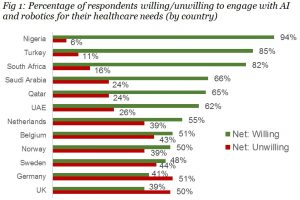Patients are ready to replace doctors with robots, even in the surgery room
55% of consumers are willing to replace human doctors with AI and robots, even in the surgery room, according to a new study, which brings up for discussion the next steps for governments, businesses and the professionals in this context.
Will artificial intelligence (AI) and robotics in medicine replace the human clinician? Not yet, but healthcare is changing and the public is ready. According to a PwC study, a majority of consumers are willing to receive care from these advanced technologies, which have the potential to transform healthcare delivery to make it better, faster and more accessible for all.
The report, titled What doctor? Why AI and robotics will define New Health, is based on a commissioned survey of over 11,000 people from 12 countries across Europe, the Middle East and Africa. Across the region, more than half of respondents (55%) said they were willing to use advanced computer technology or robots with AI that can answer health questions, perform tests, make a diagnosis and recommend treatment.
1 in 3 UK jobs to be replaced by robots in the next 20 years
Three main themes emerged from the study’s findings:
- People are increasingly willing to engage with AI and robots if it means better access to healthcare
- Speed and accuracy of diagnosis and treatment is a critical factor for this willingness
- Trust in the technology is vital for wider use and adoption; the ‘human touch’ remains a key component of the healthcare experience.
Emerging markets are most open to rely on technology for their healthcare
For all questions throughout the survey, a pattern emerged between developed and emerging economies.
People in countries with well-established, and therefore less flexible, healthcare systems (UK and Western/North Europe) were willing to engage with a non-human healthcare provider, but less so than those in emerging markets where healthcare is still being shaped and formed.

The survey found that even in the operating theatre, respondents would be willing for a robot to perform a minor surgical procedure instead of a doctor, with close to half and up to 73% of all respondents willing. Respondents in Nigeria, Turkey and South Africa were the most willing to undergo minor surgery performed by robots (73%, 66% and 62% respectively), with the UK the least willing (36%).
Afraid that robots will take away our jobs? They already began. See 10 companies that “hired” them
Perhaps unsurprisingly, the situation changed dramatically when it came to major surgery, such as replacement of a knee or hip joint, removal of a tumour, or heart surgery. Even so, a significant percentage of respondents are still willing to undergo major surgery performed by a robot: ranging from 69% in Nigeria to 40% in the Netherlands and 27% in the UK.
The key drivers for a person’s willingness or unwillingness to use a robotic health procedure
The survey also explored the key drivers for a person’s willingness or unwillingness to use an AI-enabled or robotic health procedure or service.
Easier and quicker access to healthcare services (36%) and speed and accuracy of diagnoses (33%) were the primary motivators for willingness, with lack of trust in robots being able to make decisions (47%) and lack of the human touch (41%) as the primary reasons for their reluctance.
Although percentages varied across countries, these top two advantages and disadvantages were cited in this order across all countries with the exception of Saudi Arabia and Qatar, where respondents felt the lack of ‘human touch’ was the biggest disadvantage.
Next steps for governments, businesses and the professionals
Governments need to create quality standards and a regulatory framework which are applicable to and obligatory for the entire healthcare sector, as well as the appropriate incentives for adopting new approaches, the report highlights.
At their turn, healthcare professionals need to understand how AI and robotics have the potential to work for and with them in a medical setting as well as throughout the healthcare eco-system, and be open to change.
Top 5 robots to replace humans on the job market: The customer-oriented technology revolution
Patients need to become more accustomed to AI and robots and discover its benefits for themselves.
On the other hand, the private sector developing AI and robotics need to create solutions to solve the big issues of demand and resource that every health system faces. In essence, by providing AI and robotic-driven solutions, the private sector has the opportunity to disrupt healthcare for the good.
And the decision-makers at healthcare institutions need to develop an evidence base, measure the success and the effectiveness of the new technology and prioritise and focus on what consumers want and need, PwC specialists note.